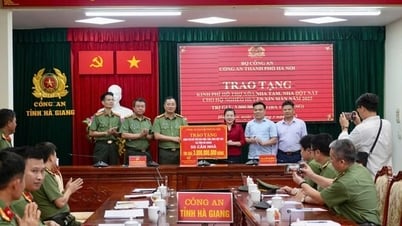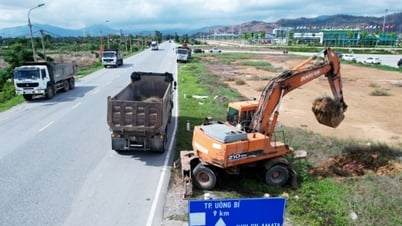
Avoid overlapping management or leaving adjudication open
Discussing at the meeting hall, National Assembly delegate Le Thanh Hoan ( Thanh Hoa delegation) was concerned about the organization of people's courts at three levels: the Supreme People's Court, provincial courts and regional courts. Regarding the issue of delimitation of authority, the delegate said that the drafting agency needs to clarify the decentralization and delegation of power. Because currently, decentralization and delegation of power are stipulated in the Law on Organization of the Government and the Law on Organization of Local Government.

According to the delegate, this draft Law strongly decentralizes and delegates power to regional courts related to administrative, economic , civil, and family cases. However, the content related to criminal cases has not been completely decentralized to the region, but is still assigned to provincial courts for sentences of 2 years or more in prison.
“If we want to thoroughly reform the apparatus, we must strongly decentralize to the regional courts to try all criminal cases. At that time, the provincial people's courts will only handle appeals, in order to thoroughly reform and be closer to the people. Along with that, we do not need to increase the number of judges of the Supreme People's Court to 27 people but keep it at the current level,” the delegate of the Thanh Hoa delegation suggested.
Delegate Thach Phuoc Binh (Tra Vinh delegation) was interested in the coordination relationship as well as the inspection and supervision sanctions between the Supreme People's Court, provincial courts and regional courts. When implementing a two-level government, regional courts will conduct first-instance trials; provincial courts will conduct appeals and final judgments.

However, the draft law has not clearly defined the inspection and supervision mechanism between these two courts. “We request that the drafting agency clarify the relationship and inspection and supervision mechanism between these two courts to avoid overlapping management or leaving the trial open. This could lead to the risk of negativity arising at the first trial level, violating professional ethics,” delegate Thach Phuoc Binh suggested.
Bankruptcy court and intellectual property court should not be established in the area.
Delegate Nguyen Thi Viet Nga (Hai Duong Delegation) said that this draft law amends and supplements many provisions related to 13 other laws, but the current name does not fully and accurately reflect the scope of the amendment. Therefore, the delegate recommended that the drafting agency consider the name of the draft law to ensure accuracy, comprehensiveness, and fully reflect the scope of the law's amendment.

Regarding the organization of bankruptcy courts and intellectual property courts in the regions, the draft law stipulates the restructuring of district, county, town, and provincial city courts and centrally run city courts into regional courts. Delegate Nguyen Thi Viet Nga said that the drafting agency should consider establishing these two courts in the regional courts, because in reality the number of cases in these two areas in a year is not large.
“In fact, many provinces and cities do not have this type of case throughout the year. Therefore, it is unreasonable to establish a specialized court for bankruptcy and intellectual property. This will lead to the appointment of additional leadership positions and staff while the trial efficiency of these courts is still low. Therefore, we can arrange specialized judges in economic and civil courts to resolve these cases in accordance with reality,” suggested the delegate of the Hai Duong delegation.

Agreeing with delegate Nguyen Thi Viet Nga on this content, delegate Pham Van Hoa (Dong Thap delegation) is also interested in establishing a regional court on intellectual property and bankruptcy. In reality, these cases are very rare, so delegate Pham Van Hoa suggested that the draft Law should be amended in the direction of having the provincial people's court handle the case, and if there is an appeal or protest, it is reasonable to transfer the case to the Supreme People's Court of Appeal for handling.
Discussing at the conference hall, delegate Nguyen Thi Thuy (Bac Kan delegation) gave her opinion on the establishment of a specialized court under the International Financial Center. The delegate stated that the International Financial Center - a launching pad for Vietnam's long-cherished growth target - is becoming a reality after the Politburo approved the policy and orientation to establish this center in Ho Chi Minh City and Da Nang.

From practical experience in the world as well as in Vietnam, delegate Nguyen Thi Thuy proposed to add some contents to the draft Law. Specifically, in the people's court system, there will be a specialized court belonging to the international financial center. The Council of Judges of the Supreme People's Court has the task of guiding the application of the principles of the common law system - the basis for dispute resolution in the international financial center.
Regarding the criteria for appointing judges, it is necessary to supplement open and specific provisions on the jurisdiction of specialized courts at the International Financial Center, which should not be too specific in the law, as a basis for the selection of judges for trial at this center. Along with that, the Supreme People's Court should have a comprehensive plan to resolve issues such as the organization of the apparatus, the relationship of this court with other courts, human resource selection, principles, procedural order, etc.

At the meeting, Chief Justice of the Supreme People's Court Le Minh Tri, on behalf of the drafting agency, received 71 comments from the group discussion and 14 from the conference hall. Mr. Le Minh Tri also explained and clarified the contents of interest to delegates related to the authority and supervision mechanism between courts at all levels; the establishment of bankruptcy courts and intellectual property courts in the region...
On the same morning, National Assembly deputies listened to the presentation and appraisal report on the investment policy of the Quy Nhon - Pleiku Expressway Construction Investment Project; and on the adjustment of the investment policy of the Bien Hoa - Vung Tau Expressway Project, Phase 1.
Source: https://hanoimoi.vn/lam-ro-co-che-kiem-tra-giam-sat-giua-toa-an-cac-cap-de-tranh-phat-sinh-tieu-cuc-702728.html


![[Photo] Panorama of the Opening Ceremony of the 43rd Nhan Dan Newspaper National Table Tennis Championship](https://vphoto.vietnam.vn/thumb/1200x675/vietnam/resource/IMAGE/2025/5/19/5e22950340b941309280448198bcf1d9)
![[Photo] General Secretary To Lam attends the conference to review 10 years of implementing Directive No. 05 of the Politburo and evaluate the results of implementing Regulation No. 09 of the Central Public Security Party Committee.](https://vphoto.vietnam.vn/thumb/1200x675/vietnam/resource/IMAGE/2025/5/19/2f44458c655a4403acd7929dbbfa5039)
![[Photo] President Luong Cuong presents the 40-year Party membership badge to Chief of the Office of the President Le Khanh Hai](https://vphoto.vietnam.vn/thumb/1200x675/vietnam/resource/IMAGE/2025/5/19/a22bc55dd7bf4a2ab7e3958d32282c15)


![[Photo] Close-up of Tang Long Bridge, Thu Duc City after repairing rutting](https://vphoto.vietnam.vn/thumb/1200x675/vietnam/resource/IMAGE/2025/5/19/086736d9d11f43198f5bd8d78df9bd41)


















![[Photo] Prime Minister Pham Minh Chinh inspects the progress of the National Exhibition and Fair Center project](https://vphoto.vietnam.vn/thumb/1200x675/vietnam/resource/IMAGE/2025/5/19/35189ac8807140d897ad2b7d2583fbae)


























































![[VIDEO] - Enhancing the value of Quang Nam OCOP products through trade connections](https://vphoto.vietnam.vn/thumb/402x226/vietnam/resource/IMAGE/2025/5/17/5be5b5fff1f14914986fad159097a677)



Comment (0)